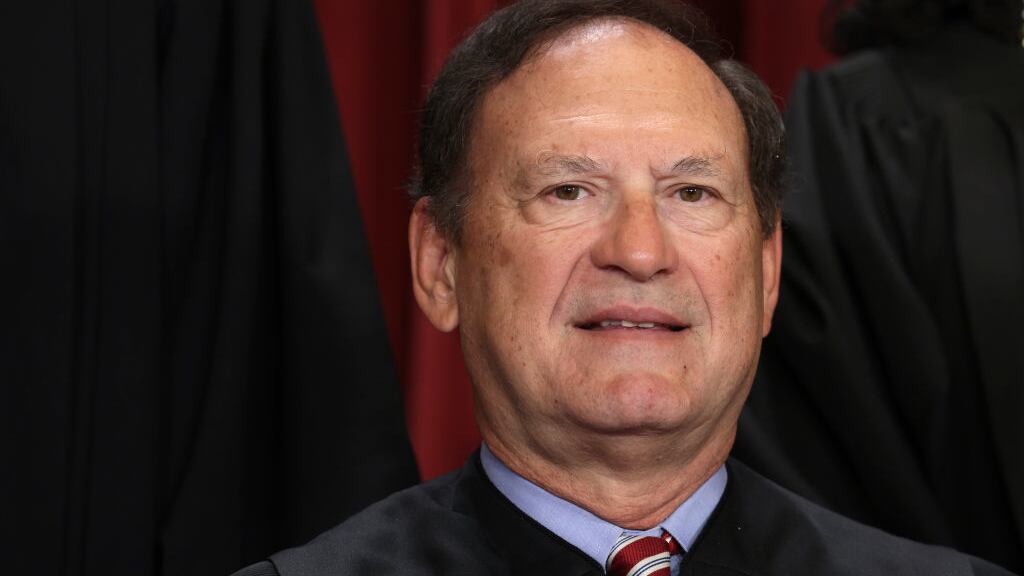Justices on the Supreme Court indicated they were likely to side with the Biden administration in their efforts to classify kits for users to build “ghost guns” at home as firearms—but not before staunch conservative Justice Samuel Alito sparked a strange debate about omelets and grocery lists.
The high court heard oral arguments as the Justice Department defends their attempts to enforce regulations against so-called “ghost guns” after an alarming spike in their use in crimes.”
In 2022, the Justice Department issued new rules that reclassified the at-home kits as firearms, making them subject to regulation by the Gun Control Act of 1968—including requiring them to have a serial number and conduct background checks on buyers.
At the time the ATF said they received 45,240 reports of “privately made firearms” seized by law enforcement in connection to crimes, including 692 related to homicides. Lawyers for the Justice Department said this constituted a 1,000% increase between 2016 and 2021.
The ATF’s rule was challenged in court the same year by a group that includes private gun enthusiasts, a gun rights nonprofit, and Tactical Machining, a company that produces individual parts to build AR-style rifles. The rule, enforced by a lower court, was frozen by the Supreme Court in August last year.
On Tuesday, at least one Supreme Court justice seemed unconvinced that these at-home kits should be classified the same as regular guns. Holding up a pen and paper, Justice Samuel Alito asked Solicitor General Elizabeth Prelogar: “is this a grocery list?”

Amy Coney Barrett and John Roberts, two of the Supreme Court's conservative justices, previously sided with liberals in allowing the ATF's regulations to go into effect.
EVELYN HOCKSTEIN/ReutersThe justice then asked if he “put out on a counter some eggs, some chopped-up ham, some chopped-up pepper, and onions, is that a western omelet?”
“The key difference here is that these weapon parts kits are designed and intended to be used as instruments of combat, and they have no other conceivable use,” Prelogar responded.
Justice Amy Coney Barrett quickly interjected, instead comparing the gun kits not to an unorganized pile of ingredients, but ingredients sold to consumers as part of a meal kit—using the popular home delivery service Hello Fresh as her example.
Barrett sided with the ATF last August, joining Chief Justice John Roberts in voting with the court’s liberal wing to uphold the regulations.
Prelogar agreed with the conservative justice. “If you bought, you know, from Trader Joe’s some omelet-making kit that had all of the ingredients to make the omelet and maybe included whatever you would need to start the fire in order to cook the omelet and had all of that objective indication that that’s what's being marketed and sold, we would recognize that for what it is,” she told the court.
Lawyers for the plaintiffs argued that the primary market for these kits were just hobbyists interested in building their own guns. “Just like some individuals enjoy, like, working on their car every weekend, some individuals want to construct their own firearm,” Peter Patterson, the lawyer representing the plaintiffs, told the court.
Prelogar noted that some of the kits sold could produce firearms within 20 minutes, and Roberts pressed the plaintiff’s counsel on this point. “Well, I mean, drilling a hole or two, I would think, doesn’t give the same sort of reward that you get from working on your car on the weekends,” the chief justice said.
Prelogar argued that if these kits were actually intended to be used by hobbyists, gun manufacturers could sell to them—by following the regulations already on the books for gun sales.
“Someone who is lawfully allowed to possess a firearm and wants to build it can purchase that kit if they undergo a background check. And so if there is a market for these products, they can operate under the statute,” the solicitor general said.
However, he also noted that the market for these gun kits “essentially collapsed” after the ATF’s rules went into effect. “It makes perfect sense, because the whole reason why you would want to get your hands on one of these unserialized, untraceable firearms is if you are a prohibited person or you want to use that gun in a crime.”









